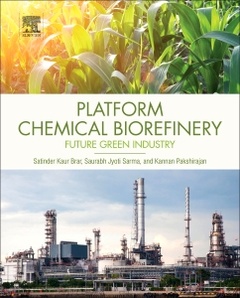Description
Platform Chemical Biorefinery
Future Green Chemistry
Authors: Kaur Brar Satinder, Jyoti Sarma Saurabh, Pakshirajan Kannan
Language: English
Subjects for Platform Chemical Biorefinery:
Keywords
1, 3-Propanediol, 1, 5-Diaminopentane, 2, 5-Furandicarboxylic acid, 3-Hydroxypicolinic acid, 3-Hydroxy-propionate, 3-Hydroxy-propionic acid, 5-Aminovalaric acid, Acetaldehyde, Agro industrial waste, Alcohols, Animal fat, Application, -arginine, Bio-based platform chemical, Biobutanol, Biocascading, Bioconversion, Biodegradable polymers, Biodiesel, Bioethanol, Biofuel, Biofuels, Biogas, Biomass conversion, Biomass feedstocks, Biomass, Biopolymers, Bioproduction, Bioproducts, Biorefinery, Building block, Butyric acid, C3 platform chemicals, C6 platform chemicals, Cargill, Catalyst, Challenges, Commercial potential, CPG, Cyanophycin, Deforestation, Downstream processing, Drop in chemicals, Economic process, Energy security, Enzymes, Feedstock conversion, Feedstocks, Food security, Food-fuel competition, Fumaric acid, Furfural, Global production, Glucaric acid, Gluconic acid, Glutamic acid, Glycerol, Greenhouse gas, hemical synthesis, Heterogeneous catalysis, Homofermentation, Hydroxyl propionyl-CoA, Hydroxymethyl furfural, Industrial scale, Integrated biorefinery, Isosorbide, Itaconic acid, l, Land use change, Levulinic acid, Life cycle assessment, Malic acid, Metabolic engineering, Methyltetrahydrofuran, Microalgae, Microbial fermentation, Microbial platform, Morphology, Oleochemicals, Organic acids, Phycochemicals, Platform chemical, Platform chemicals, Platform molecules, Platform, Polyaspartyl, Pretreatment, Product quality, Product recovery efficiency, Propylene glycol, P-Series fuel, r-DNA, Renewable platform chemicals, Renewable resources, Renewable, Rhizopus oryzae, Sorbitol, Succinic acid, Sustainability, Systems biology, Value-added products, Vegetable oil, Waste, Xylitol
187.99 €
In Print (Delivery period: 14 days).
Add to cart528 p. · 19x23.3 cm · Hardback
Description
/li>Contents
/li>Readership
/li>Biography
/li>Comment
/li>
Platform Chemical Biorefinery: Future Green Chemistry provides information on three different aspects of platform chemical biorefinery. The book first presents a basic introduction to the industry beneficial for university students, then provides engineering details of existing or potential platform chemical biorefinery processes helpful to technical staff of biorefineries. Finally, the book presents a critical review of the entire platform chemical biorefinery process, including extensive global biorefinery practices and their potential environmental and market-related consequences.
Platform chemicals are building blocks of different valuable chemicals. The book evaluates the possibility of renewable feedstock-based platform chemical production and the fundamental challenges associated with this objective. Thus, the book is a useful reference for both academic readers and industry technical workers. The book guides the research community working in the field of platform chemical biorefinery to develop new pathways and technologies in combination with their market value and desirability.
1. Platform chemicals- significance and need
2. Biorefinery- general overview
3. Petroleum versus biorefinery based platform chemicals
4. Life cycle analysis of potential substrates of sustainable biorefinery
5. Propylene glycol – an industrially important C3 platform chemical
6. 3-hydroxypropanoic acid production from renewable resources and its commercial significance
7. Butyric acid – a platform chemical for biofuel and high value biochemicals
8. Fumaric acid – biotechnological production of the platform chemical by Rhizopus oryzae
9. Malic and succinic acid – potential C4 platform chemicals for polymer and biodegradable plastic production
10. Potential application of renewable itaconic acid for the synthesis of 3-methyltetrahydrofuran
11. Production of renewable C5 platform chemicals and potential applications
12. Sorbitol production from biomass and its global market
13. Sugar derived industrially important C6 platform chemicals
14. Production of drop in and novel bio-based platform chemicals
15. Platform chemicals and pharmaceutical industries
16. Biorefinery and possible deforestation
17. Biorefinery and possible negative impact on food market
18. Algal biorefinery for high value platform chemicals
19. Animal fat and vegetable oil based platform chemical biorefinery
20. Platform chemical biorefinery and agro-industrial waste management
21. Integrated biorefinery for food, feed and platform chemicals
22. Integrated biorefinery for bioenergy and platform chemicals
23. Microbiology of platform chemical biorefinery and metabolic engineering
24. Enzymes in platform chemical biorefinery
25. Process design and optimization for platform chemical biorefinery
26. Case studies on industrial production of renewable platform chemicals
Primary audience: Chemical/biochemical engineers, biotechnologists, biochemists, as well as industrial microbiologists, environmental biotechnologists, environmental engineers. Professional researchers working in the industries dealing with industrial chemical manufacturing or industrial biotechnology
Saurabh Jyoti Sarma is a researcher at INRS-ETE, Canada, and has completed his Ph.D. from the same institute. He is one of the associate editors of “Nanotechnology for Environmental Engineering, an international journal of Springer. He is also a guest editor of “Biofuels (Special issue: Biorefinery for fuels and platform chemicals), an international journal published by Tailors & Francis. Before joining INRS-ETE he had received a research fellowship from DST, government of India and for nearly 3 years he had worked as a research fellow at IIT Guwahati, India. He is a recipient of prestigious merit scholarship for foreign students (FQRNT) offered by Government of Canada; postdoctoral research fellowship of University of Calgary, Canada; doctoral research fellowship of INRS-ETE, Canada; supplementary grant for doctoral study from CRIQ, Canada as well as travel grant (Brazil) offered by ministry of international relation, Quebec, Canada. His expertise includes pilot scale (2000 l) fermentation, pilot scale ultrafiltration and nano-sp
- Offers comprehensive coverage of platform chemicals biorefineries, recent advances and technology developments, potential issues for preventing commercialization, and solutions
- Discusses existing technologies for platform chemicals production, highlighting benefits as well their possible adverse effects on the environment and food security
- Includes a global market analysis of platform chemicals and outlines industry opportunities
- Serves as a useful reference for both academic readers and industry technical workers
These books may interest you

Sustainable Bioenergy Production 220.72 €



